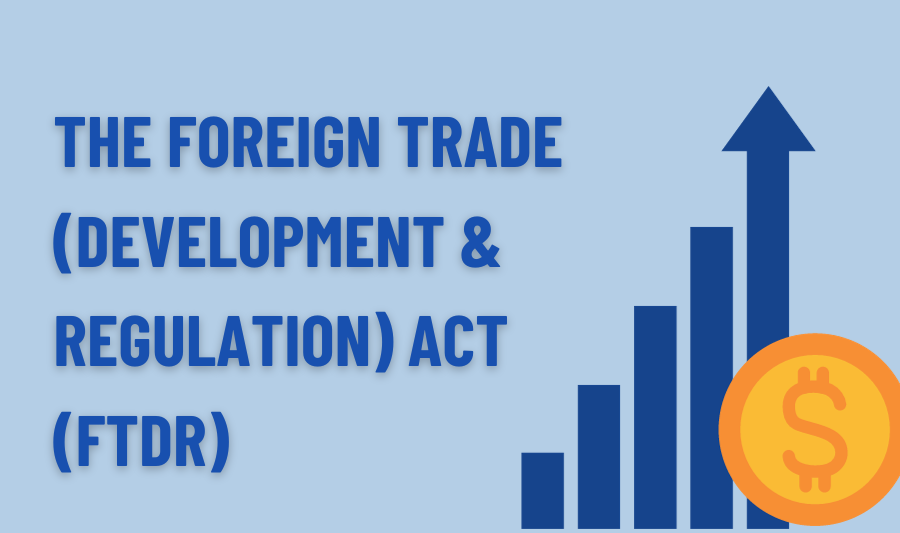INTRODUCTION
The Foreign Trade (Development & Regulation) act (FTDR), 1992 basically introduces the concept of Imports to India and exports from India. The main objective of the FTDR, 1992, is to strengthen the legislation of foreign exchange by making it easier for imports into the nation and by taking steps to increase exports from India and other related things. Based on this Act, the Central Government has complete power to control the regulations of foreign trade.
THE FOREIGN TRADE (DEVELOPMENT & REGULATION) ACT, 1992
Directorate General of Foreign Trade, appointed by the Central government under Ministry of Commerce and Industry (Department of Commerce) in official gazette’s recent notification on 11th September, 2023, made an Amendment in Export Policy of Food Supplements containing botanicals.
Based on the Powers to make provisions relating to imports and exports with regards to foreign trade policy under section 3 and section 5 of the The Foreign Trade (Development & Regulation) act, 1992, The Central Government amended the schedule -2 of Indian Trade Classification (Harmonized System) (ITC (HS)) Export Policy, 2018. Section 3 of the act empowers central government to make provisions related to development and regulation of foreign trade and impose restrictions and prohibitions on foreign trade by order published in the official gazette. Section 5 of the act specifies that by notification in the official gazette the amendment with regards to Foreign Trade Policy is published by central government with exceptions, modifications if provided.
Para. 2.01 of the Foreign Trade Policy sets the provisions which says that “Exports and Imports shall be ‘Free’ except when regulated by way of ‘prohibition’, ‘restriction’ or ‘exclusive trading through State Trading Enterprises (STEs)’ as laid down in Indian Trade Classification (Harmonized System) [ITC (HS)] of Exports and Imports.”
Based on the notification in the official gazette the entire focus is on export as schedule 2 of the Indian Trade Classification (Harmonised system) is an export policy. ITC (HS) is a compilation of codes for all merchandise or goods for export/import. India maintains national Harmonized System of goods at 8-digit level unlike International Harmonised system.
Indian Trade Classification (Harmonized System) Code 1302 which is Vegetable saps and extracts; pectic substances, pectinates and pectates; agar-agar and other mucilage and thickeners, whether or not modified, derived from vegetable products. Indian Trade Classification (Harmonized System) Code 2106 which is Food preparations not elsewhere specified or included. The present policy of both the code’s description is free to export without the permission of Directorate General of Foreign trade but, there is a slight change in the policy. Previously, based on the official gazette, “the export of Food Supplements containing botanicals to European Union (EU) and United Kingdom (UK) originating in or consigned from India and intended for human or animal consumption, was allowed subject to issuance of the official certificate issued by Export Inspection Council (EIC)/ Export Inspection Agencies (EIAs), the designated Competent Authority for issuance of official certificate. The official certificate will be issued based on the satisfactory analytical test report from EIC/EIA approved laboratories for the purpose as per the requirement laid down by EU.” Here, Export Inspection Council (EIC)/ Export Inspection Agencies (EIAs) certification was the only condition for which exports were free to operate without the permission of Directorate General of Foreign Trade.
Based on the present amendment and notification in the official gazette, “The export of Food Supplements containing botanicals to European Union (EU) and United Kingdom (UK) originating in or consigned from India and intended for human or animal consumption, also allowed, subject to issuance of the official Certificate by the designated Export promotion Counsil, SHEFEXIL, as Competent Authority for a period of three months from the date of issuance of this Notification, based on the satisfactory Analytical Test Report from National Accreditation Board for Testing & Calibration Laboratories (NABL) accredited laboratories for ETO testing for Food Supplements containing Botanicals approved for the purpose as per the requirement laid down by EU based on official notification.” Food products exported from India must have a Transaction Certificate, issued by a certification body. To obtain such a certificate, there must be an ETO test report issued by a laboratory that is duly accredited by NABL to undertake this test. It means, apart from Export Inspection Council (EIC)/ Export Inspection Agencies (EIAs) certifications, the official Certificate by the designated Export promotion Counsil, SHEFEXIL is allowed for a period of three months for the export of description mentioned as per code 1302 and 2106 of the schedule-2 of Indian Trade Classification (Harmonized System) ITC (HS).
CONCLUSION
The notification published in the official gazette by the Directorate General of Foreign Trade based on powers to make provisions with respect to Foreign Trade Policy under section 3(the Powers to make provisions relating to imports and exports) and, section 5 (With respect to foreign trade policy) of the The Foreign Trade (Development & Regulation) act, 1992, made an amendment in schedule -2 of Indian Trade Classification (Harmonized System) ITC (HS) Export policy, code 1302 and 2106 intended for human or animal consumption to European Union and United Kingdom will require issuance of official certificate by Export Inspection Council (EIC)/ Export Inspection Agencies (EIAs) or designated Export promotion Counsil SHEFIXIL. SHEFEXIL is allowed to issue an official certificate for a period of three months from the date of issuance of this Notification. By adding one more designated authority to allow certifications increases the easiness of export of goods from India, thus helps in promoting foreign trade and flow of business which is the primary objective of foreign trade policy, 2023.

